Homeless Veterans - Pictures vs Facts
May 21, 2007 · 15 Comments
Signs of Homeless Veterans
If you search the net for homeless veterans pictures, you will find a lot. All of these came from Flikr.
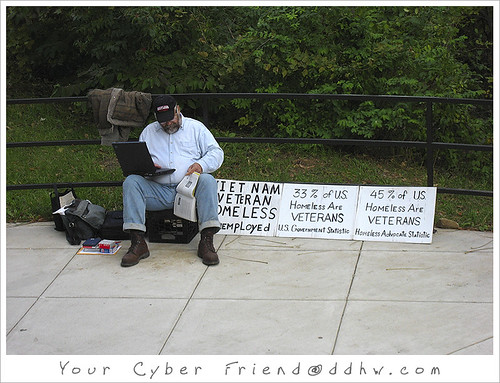 This picture came from: Your Cyber Friend
This picture came from: Your Cyber Friend
One sign says 33% of US homeless are Veterans US Government Sources
Another says 45% of US homeless are Veterans Homeless Advocate Sources
They are both close to right. The US Sources reference the total homeless population, including men, women and children. The Homeless Advocate Sources reference the total homeless male population above 18 years of age. The latter one makes more sense. My personal research shows 43% of all male homeless are veterans. Almost half of the men you see are homeless veterans. Something is not right about that, our country needs to do more - a lot more!
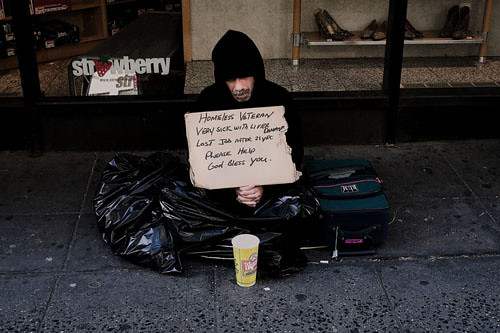 This picture came from Shrued’s photostream.
This picture came from Shrued’s photostream.
The sign says Homeless Veteran Very Sick with Liver Damage. Lost Job after 21 years. Please Help. God Bless You.
According to the National Coalition for Homeless Veterans (NCHV) 76% of homeless veterans experience alcohol, drug, or mental health problems
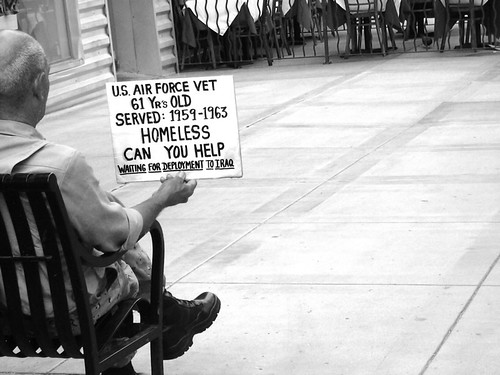 This picture came from francography’s photostream
This picture came from francography’s photostream
This Air Force vet says he is 61 years old, served 1959-1963, is homeless. ”Can you help Waiting for Deployment to Iraq“
NCHV says 46% of homeless veterans are age 45 or older compared to 20% for homeless non-veterans.
47% are from the Vietnam Era.
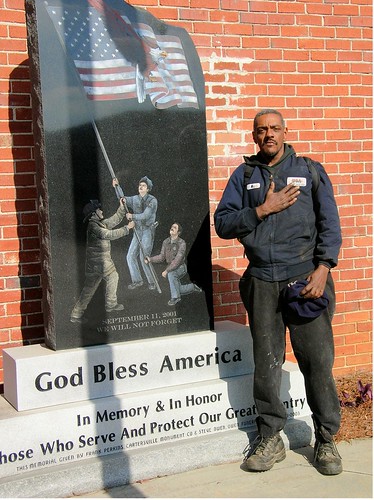 This photo came from Kenny429252
This photo came from Kenny429252
Kenny says this about the photo:
“Cartersville, GA. Came across this guy today and he wanted me to get his photo standing next to this monument. He is an Army Veteran and served in combat during the Panama Canal Invasion. Sad thing is he is homeless. ”
Wikipedia says this: “The military incursion into Panama began on December 20, 1989, at 0100 local time. The operation involved 27,684 U.S. troops and over 300 aircraft. (…)
These were deployed against the 16,000 members of the Panama Defense Force“an0nym0usmuse
NCHV says that from their surveys, 45% of the homeless veterans cite needing help finding a job. Whoever lost this sign is one of them.
There should be no need for our homeless Heroes to have to carry a sign.
We need to do something now!
Categories: Iraq · VA · Vietnam · disabled vets · drugs · homeless · homeless vets · images · pictures · signs · statistics
Tagged: African American, Air Force, alcohol, Cartersville, demographics, disabled vets, drugs, Flikr, Heroes, homeless, homeless vet, homeless vets, homelessness, images, Iran, military, missions, NCHV, Panama, photo, pictures, signs, statistics, street person, troops, VA, vet, veteran, Vietnam
Lawsuit: Veterans Affairs Has Failed to Prevent Suicides
Sunday, April 20, 2008

The U.S. Department of Veterans Affairs isn't doing enough to prevent suicide and provide adequate medical care for Americans who have served in the armed forces, a class-action lawsuit that goes to trial this week charges.
The lawsuit, filed in July by two nonprofit groups representing military veterans, accuses the agency of inadequately addressing a "rising tide" of mental health problems, especially post-traumatic stress disorder.
But government lawyers say the VA has been devoting more resources to mental health and making suicide prevention a top priority. They also argue that the courts don't have the authority to tell the department how it should operate.
The trial is set to begin Monday in a San Francisco federal court.
An average of 18 military veterans kill themselves each day, and five of them are under VA care when they commit suicide, according to a December e-mail between top VA officials that was filed as part of the federal lawsuit.
"That failure to provide care is manifesting itself in an epidemic of suicides," the veterans groups wrote in court papers filed Thursday.
A study released this week by the RAND Corp. estimates that 300,000 U.S. troops — about 20 percent of those deployed — are suffering from depression or post-traumatic stress from serving in Iraq and Afghanistan.
"We find that the VA has simply not devoted enough resources," said Gordon Erspamer, the lawyer representing the veterans groups. "They don't have enough psychiatrists."
The lawsuit also alleges that the VA takes too long to pay disability claims and that its internal appellate process unconstitutionally denies veterans their right to take their complaints to court.
The groups are asking U.S. District Court Judge Samuel Conti, a World War II U.S. Army veteran, to order the VA to drastically overhaul its system. Conti is hearing the trial without a jury.
"What I would like to see from the VA is that they actually treat patients with respect," said Bob Handy, head of the Veterans United for Truth, one of the groups suing the agency.
Handy, 76, who retired from the Navy in 1970, said he founded the veterans group in 2004 after hearing myriad complaints from veterans about their treatment at the VA when he was a member of the Veterans Caucus of the state Democratic Party. The department acknowledges in court papers that it takes on average about 180 days to decide whether to approve a disability claim.
"I would just like to see the VA do the honorable thing," said Handy, who is expected to testify during the weeklong trial.
Justice Department spokeswoman Carrie Nelson declined comment Friday.
But government lawyers have filed court papers arguing that the courts have no authority to tell the VA how to operate and no business wading into the everyday management of a sprawling medical network that includes 153 medical centers nationwide.
The veterans are asking the judge "to administer the programs of the second largest Cabinet-level agency, a task for which Congress and the executive branch are better suited," government lawyers wrote in court papers.
If the judge ordered an overhaul, he would be responsible for such things as employees workloads, hours of operations, facility locations, the number of medical professionals employed, and "even the decision whether to offer individual or group therapy to patients with" post-traumatic stress, the papers said.
The VA also said it is besieged with an unprecedented number of claims, which have grown from 675,000 in 2001 to 838,000 in 2007. The rise is prompted not from the current war, but from veterans growing older, government lawyers said.
"The largest component of these new claims is the aging veteran population of the Vietnam and Cold War eras," the government filing stated. "As they age, older veterans may lose employment-related health care, prompting them to seek VA benefits for the first time."
Government lawyers in their filings defended its average claims processing time as "reasonable," given that it has to prove the veterans disability was incurred during service time.
They also noted the VA will spend $3.8 billion for fiscal year 2008 on mental health and announced a policy in June that requires all medical centers to have mental health staff available all the time to provide urgent care. They said that "suicide prevention is a singular priority for the VA."
The VA "has hired over 3,700 new mental health professionals in the last two and a half years, bringing the total number of mental health professionals within VA to just under 17,000. This hiring effort continues," they said.
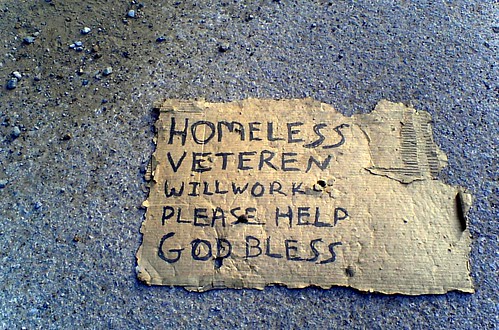 This tattered sign comes from
This tattered sign comes fromHomeless Veterans
|
| Español | VA Forms | Locations | Contact the VA | Frequently Asked Questions (FAQs) Privacy Policy | Web Policies & Important Links | Freedom of Information Act Annual Performance and Accountability Report | Small Business Contacts | Site Map USA.gov | White House | USA Freedom Corps |
| Reviewed/Updated Date: January 16, 2009 |

No comments:
Post a Comment